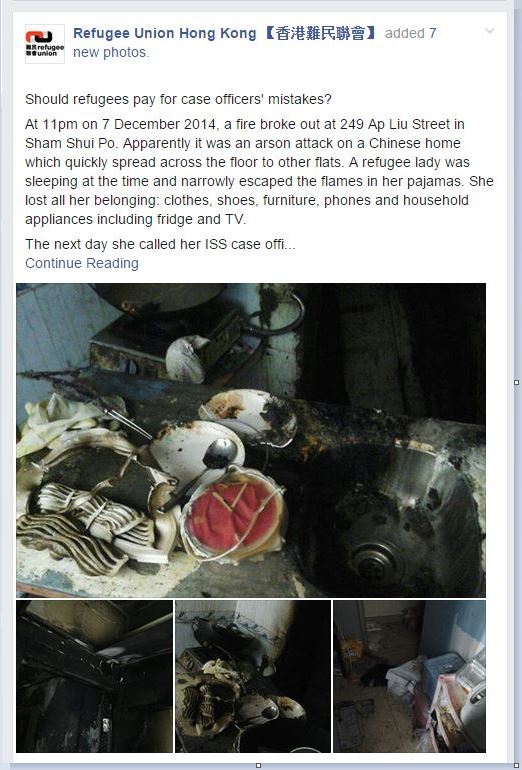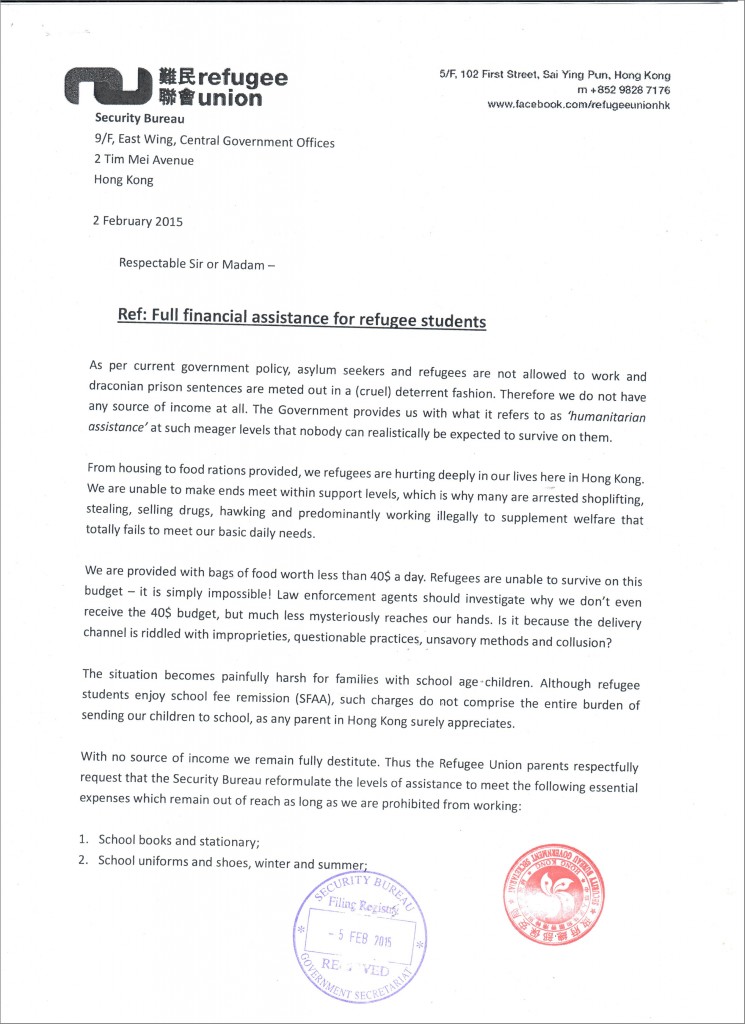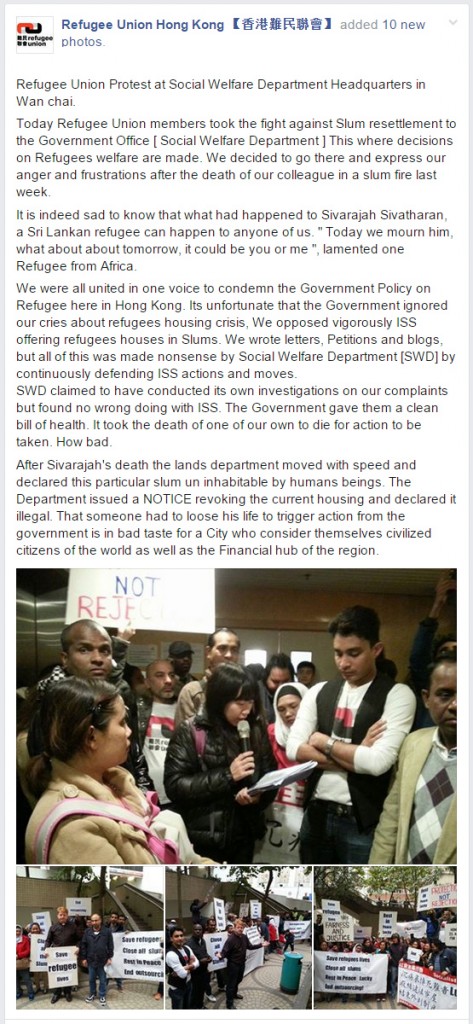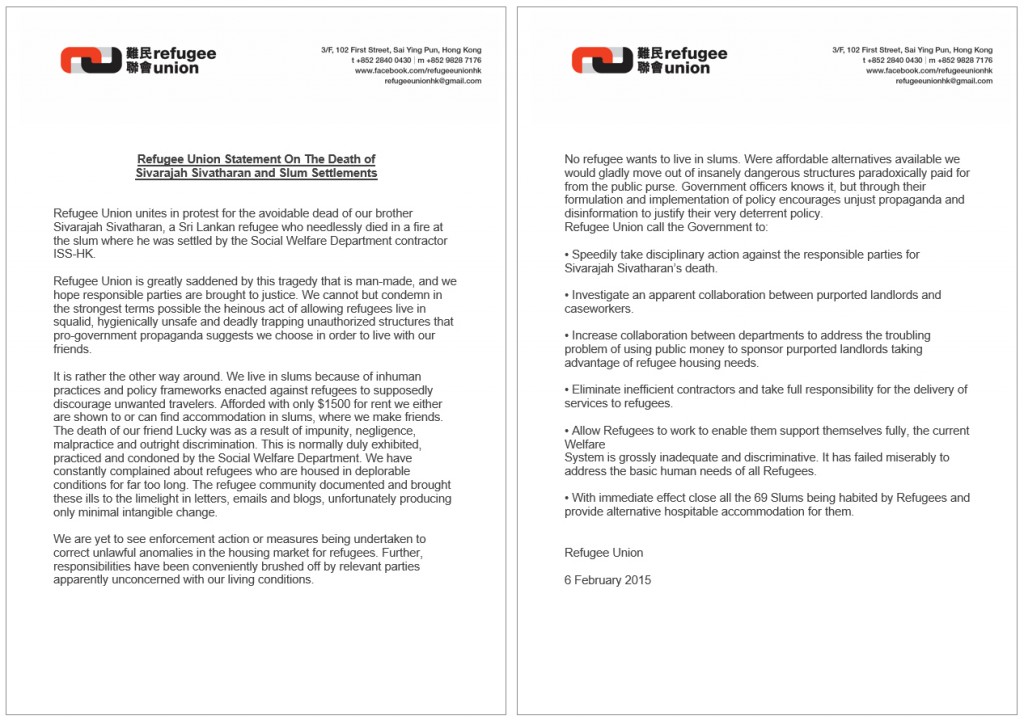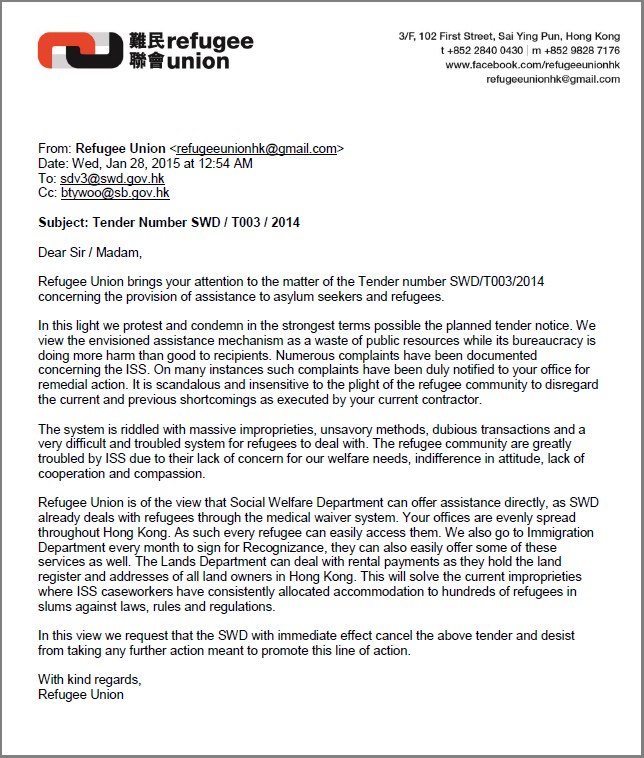Vision First supports lawmaker Fernando Cheung Chiu-hung
Mar 5th, 2015 | Advocacy, Crime, Refugee Community, Welfare | Comment
We are deeply saddened by the arrest of a great political supporter, the Honorable Fernando Cheung.
Fernando stands apart for his commitment to refugees going back over a decade. Veteran refugees recall him visiting them in prisons and Immigration detention ten years ago, when the injustice they suffered didn’t yet register with the broader society and media as today.
Fernando has a special heart for all the vulnerable and disenfranchised people in Hong Kong, with no exception. He always displayed the very best of Hong Kong hospitality to refugees who suffer unjustly against government policies aimed at discouraging, rather than assisting, seeking asylum.
The charges seem political. Hong Kong Government is on a witch-hunt to punish the organizers of the Occupy movement that challenged their authority.
We fervently hope that justice will prevail.
Fernando did the right thing – he stood resolutely with the people unafraid of the consequences.
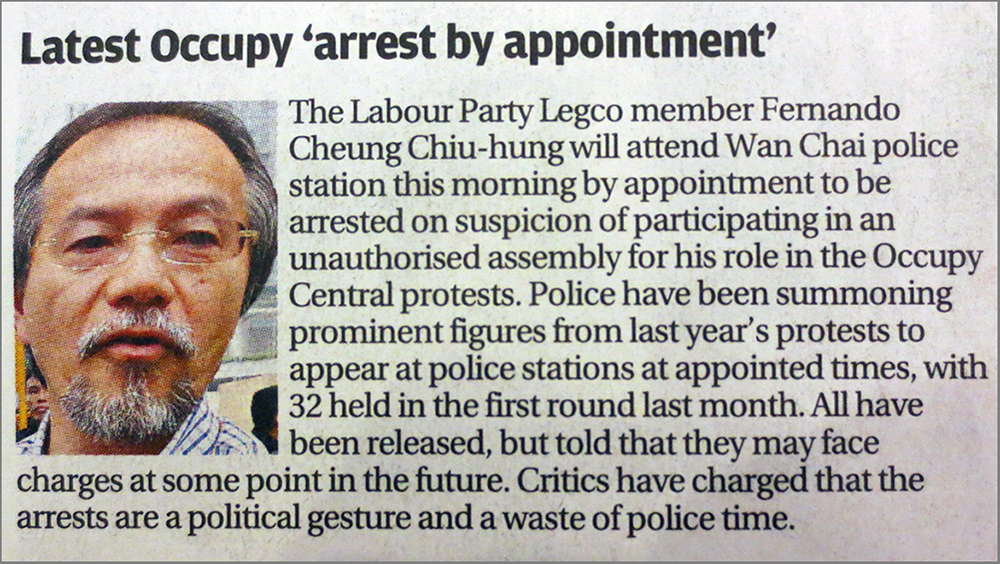
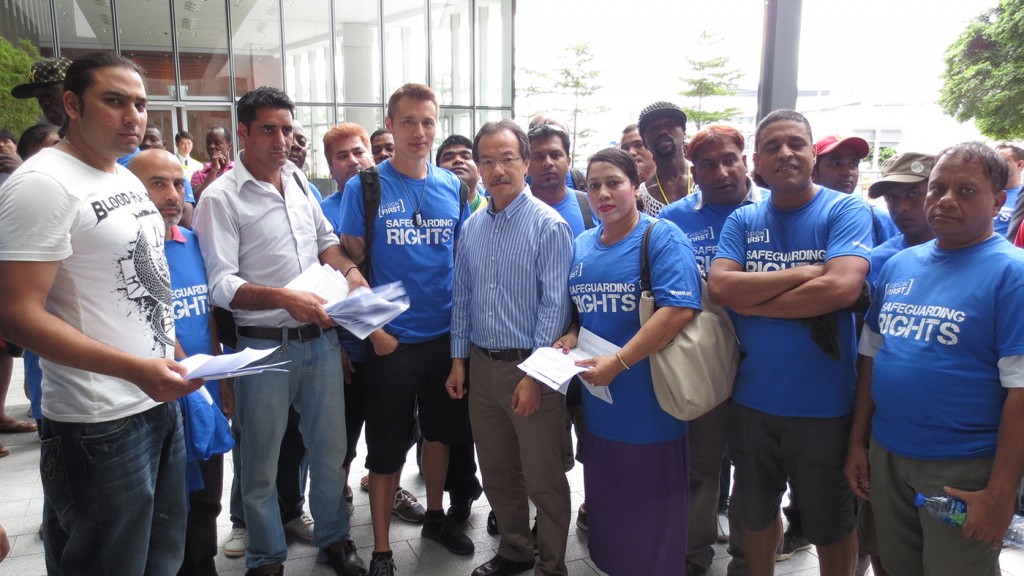
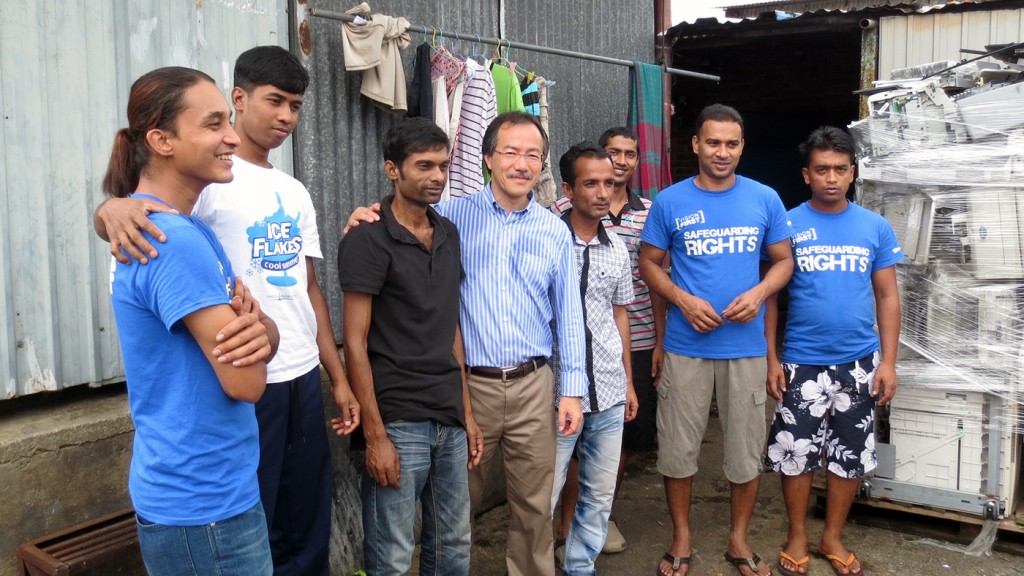
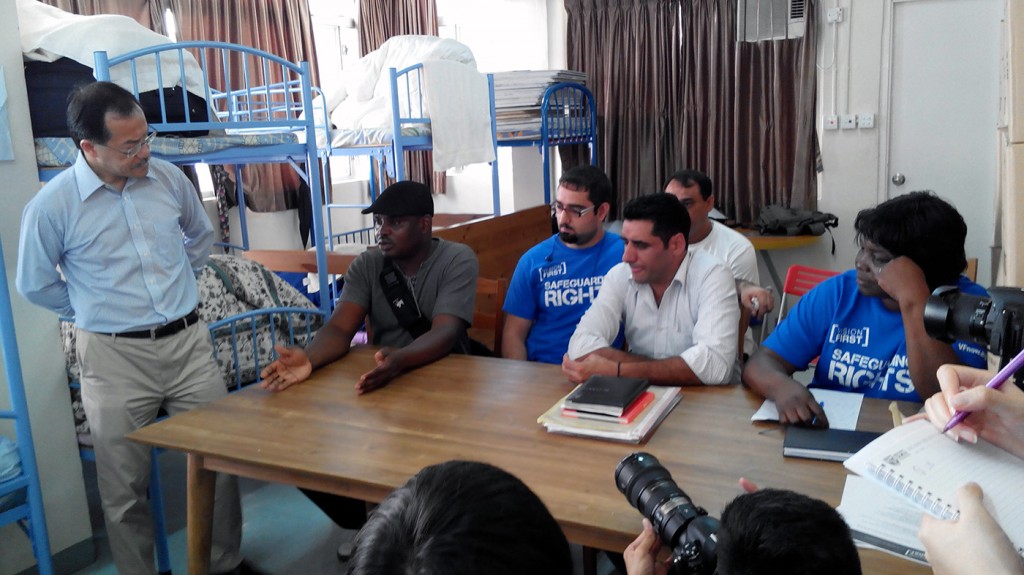
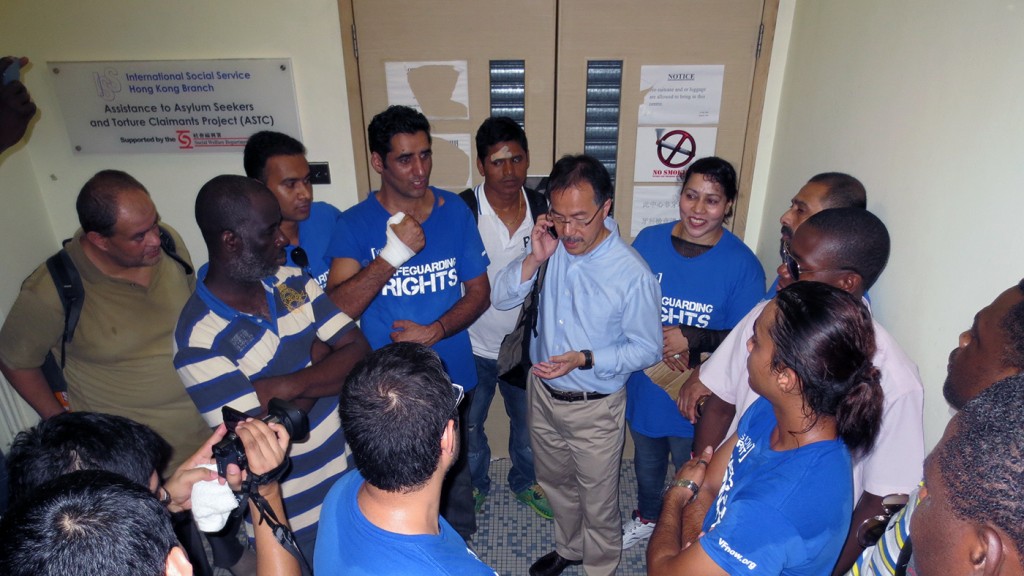
Should refugees pay for case officers’ mistakes?
Feb 28th, 2015 | Crime, Housing, Personal Experiences, Refugee Community, Welfare | Comment
Fire burns through a refugee slum, again
Feb 26th, 2015 | Crime, Housing, Refugee Community, Welfare | Comment
On 25 February 2015 at 10:30pm alarming SMS circulated, “Good evening, I want to give information. There is fire in the Chung Uk Tsuen [slums] near the home of Yusna. Precisely in the house of Refugee Union Francesca … two houses burnt to a crisp … She was rushed to the hospital because she was limp and panic.”
A month after a fire took the life of Sri Lankan refugee Lucky, another blaze raged through a compound near Tuen Mun, in an area with the highest concentration of refugee slums supported by ISS-HK with government funds. An intricate maze of narrow paths intersect agricultural lots where rusty, ramshackle ruins of pigsties and chicken sheds are turned into illegal dwellings.
It is reported that a gas cylinder blew up in the shack of a resident Pakistani, starting a blaze that engulfed the compound familiar to Vision First as “The slum with the rusty gate”, reported on 4 October 2013. At the time we noted that residents lived in and maintained better abodes than penniless refugees who cannot afford repairs and whose ISS-HK contracts displayed fake addresses.
Police cordoned off the area to facilitate the work of dozens of firemen and medics who worked frantically till 2pm. Preliminary information indicates that the blaze broke out shortly after 9pm and took almost four hours to extinguish presumably due to a lack of fire hydrants and vehicular access, combined with challenging nighttime conditions.
Assuming that all slum dwellers escaped unscathed, the complex erection of several shacks on two storeys and the unregulated storage of gas cylinders probably increased the danger faced by rescuers. This blaze didn’t only threaten the life and property of refugees, but also of residents who apparently don’t enjoy the building standards and fire safety regulations which ought to protect everyone by law.
Vision First is concerned about Francesca and her two year-old son Ismaeel who lived in one of the huts reported to have burned to ashes. In 2010 Francesca fled to Hong Kong with a well-founded fear for her life. She was not a domestic worker. The awful living conditions she endured in the slum bore witness to the severity of the domestic violence that compelled her to leave five children behind.
Last night Francesca was taken by ambulance to hospital in a state of shock. She often complained about her dangerous hut, but had no money to relocate. Her home flooded in the rain, backed in the sun and seemed poised to collapse under its own weight. Hers was one of the worst shacks documented and a crying shame for caseworkers who permitted a mother and baby to live there.
An act of God draws attention again to the slums where indigent people – in this case residents and refugees – live in hazard conditions that the authorities chose to ignore despite their very existing challenging rules and regulations. An activist observed, “The rule of law is bent. But since no one complaints, it is fine. Let business go unimpeded, since business is all that matters in Hong Kong.”
Seeking asylum – Day One
Feb 25th, 2015 | Immigration, Refugee Community, Rejection, VF Opinion | Comment
“I am so scared. I haven’t slept for three days. I am afraid Immigration will arrest me and put me in CIC [detention centre]. I don’t want to be deported because I can’t go back to my country,” sighed a 40 year Srilankan mother who secured informal refuge in Hong Kong through the domestic worker scheme – not an unusual practice for women escaping domestic, gender, ethnic or political violence in her country.
Vision First accompanied Ibrahim of the Refugee Union on an escort mission to Immigration Skyline Tower, in Kowloon Bay, where new asylum seekers are required to report to the General Investigation Section prior to lodging non-refoulement claims. The process is nerve-racking for persons who overstayed visas, or might have entered illegally, and must then surrender to immigration authorities to establish a protection status and void being arrested by police in the street.
“Without the Refugee Union I was too scared to surrender. I didn’t reported for two years to Immigration after I was terminated. I didn’t know what to do. I am afraid the police will arrest me,” remarked an undocumented Indonesian woman whose passport was retained by an agency for failing to settle exorbitant fees relating to her dismissal. “I better be a refugee in Hong Kong than go back. I owe loansharks 82 million Rupiah. They threatened to kill me if I don’t pay back with interest!”
“Before taking them to Kowloon Bay,” explained Ibrahim, “we register new cases and email Immigration with details and copies of documents. Only after receiving replies I bring them here to make sure new [claimants] are not arrested. Officers play tricks with those who come alone, like refusing to accept claims for some reason, or demanding documents they cannot produce. But if we go with them they will not arrest you.”
The lavish decor of this prestigious commercial building contrasts starkly with the grim tasks faced by dozens of hopefuls who commence their asylum ordeal at Skyline Tower with understandable trepidation. They start queuing up every morning at 8am on the ground floor, among officer workers accustomed to their presence, knowing that by 1030 an unofficial daily quota is closed and latecomers are gruffly waved away.
On 24 February we spoke with citizens from Gambia, Pakistan, Nepal, Tanzania, Srilanka, India, Bangladesh, Vietnam, Nigeria and Indonesia who were unwilling to leave Hong Kong and understood that seeking asylum was the only pathway to remain legally for as long as they could. “I need more time. I have problems back home that make it dangerous for me. I don’t want to live in Hong Kong, but for now I must stay until I figure it out!” explained an African who had lived three years in China.
The lifts of Skyline Tower keep releasing a mix of colourful characters on the 5th floor landing. Confused and befuddled overstayers emerged with eyes darting left and right searching for clues. They were visibly nervous and probably uninformed about an asylum adventure that equally ill-informed peers might have recommended. At this stage, a credible and independent information service could possibly guide hundreds towards wiser and more practical choices.
Immigration officers at the only counter are likely challenged by a ten-fold surge in asylum claims: from 491 cases in 2013, to 4634 between March and December 2014. The authorities might find it hard to explain the unprecedented surge despite policies designed to avoid ‘creating a magnet effect which could have serious implications on the sustainability of our current support systems and on our immigration control.’ The time might have come to completely overhaul the asylum process.
The cultural clash at the General Investigation counter is absolute: on one side of the window is a strained officer fielding questions in English and Chinese (resident friends seem to prefer the latter); while on the other side an anxious bunch presses for attention without the benefit of a number system. It becomes clear why the meek and less assertive are bounced back week after week.
Here is the gate that should bear the infernal sign: “Abandon hope all ye who enter here!” it is here that passports are sequestered, sometimes not be returned for years, and options reduced. For a few hours the hopeful pace anxiously the 5th floor lobby where neither a bench nor stool welcomes the weary. Then the system starts to divide: the fortunate are asked to photocopy documents and take a photo (average cost 70$), while the unfortunate are given a notice to return in a week or two.
There is a sense of relief among those who received a numbered ticket to queue up for the photo booth in room 504. They appreciate that they were not detained and in the afternoon they will obtain a Recognizance Form 8 issued by Hong Kong Immigration to overstayers seeking asylum. At this moment, the hopeful care less about the zero percent acceptance rate and more about the opportunity to remain in town for a few more months or years.
After Immigration officially releases them on recognizance, having established a breach of the original conditions of entry – thus criminalizing them as overstayers – asylum seekers may proceed to the 9th floor to lodge a USM claim. The process is simple: they submit a now standard form that circulated since January 2013 (it was first distributed by Vision First) and request a photocopy with a date stamp. A few weeks later Immigration will follow up with a request for written significations of claims and eventually offer an appointment to record fingerprints and photos.
Three times a week Ibrahim guides Refugee Union members to Kowloon Bay. He jokes about an officer complaining, “Don’t keep bringing people here, you make us busy”. Another officer once asked him for ID and wasn’t satisfied when he produced a RU membership card. Ibrahim was unfazed, “If you don’t like it, arrest me and call the police. They will confirm that they registered the Refugee Union to help all these people who are waiting here and wonder the streets without papers.”
RU letter to Security Bureau on full assistance for students
Feb 24th, 2015 | Refugee Community, Welfare | Comment
RU proposes caseworkers sign leases
Feb 24th, 2015 | Housing, Refugee Community, Welfare | Comment
The Refugee Union floated a new idea as reported by a recent post on Facebook. The SWD or ISS-HK should sign the lease agreements with landlords to house refugees. The proposal makes perfect sense because refugees:
- Are entirely and passively dependent on welfare;
- Did not determine the rent assistance of 1500$;
- Have no savings or income to handle economic transactions;
- Are prohibited from working under threat of 15-22 months jail;
- Have no bargaining power with landlords and agents.
The Hong Kong Government ensures that refugees suffer destitution with the aim of avoiding the creation of a ‘magnet effect’ that would encourage others to seek asylum in the city. As such, the authorities are responsible for their lodging, food, clothing and medical services of this group.
Given that refugees often scramble for cash to purchase necessities such as cooking gas and shoes, it is unreasonable to expect penniless people to sign a 12 to 24 month tenancy agreement for residences that, in today’s market, typically cost more than 2500$ when assisted with only 1500$.
No wonder estate agents and landlords are loath to rent properties to refugees. Property owners expect to be paid rent monthly and don’t appreciate chasing tenants for payments which might be indefinitely delayed due to lack of income. Who in his right mind would rent his property to an unemployed individual who has no savings and work rights?
By deciding that refugees should not work, the government denied the entire group participation in solving the problems relating to their livelihood. By doing so, the authorities effectively reduced them to ‘children of the state’, who can do nothing more than beg from charities and well-wishers. If that is the nature of seeking asylum in Hong Kong, then refugees are 100% dependent on the state.
There are other advantages to having caseworkers secure and sign lease agreements. First, they would experience the stress of flat hunting with a laughable 1500$ budget. Second, they would appreciate negotiations with wary agents and landlords unsure who will foot the bill. Third, they might become advocates for a better housing policy as they clash against the inadequacy of current arrangements.
It seems that refugees have had enough of the housing games and want caseworkers to handle the impossible task of renting rooms for a 1500$ budget and dealing with the complications that arise from forced cohabitation when several individuals share a tiny room. The question is how will refugees compel caseworkers to step into this minefield?
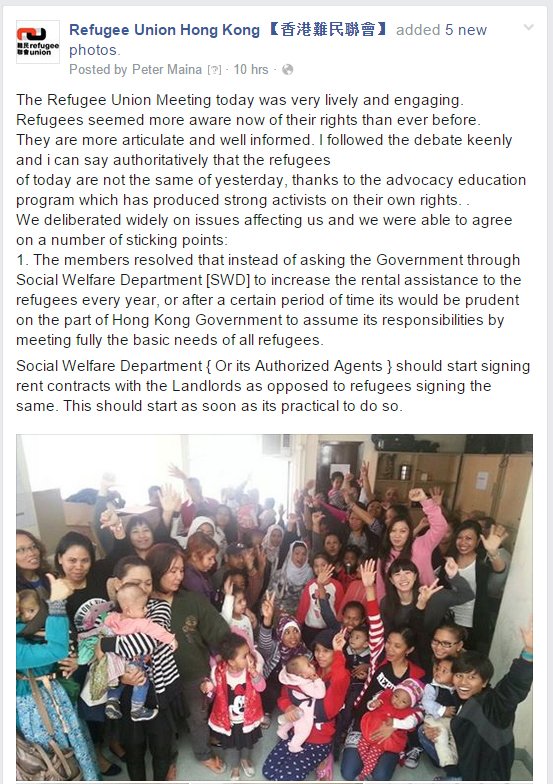
Homeless refugees demand proper housing
Feb 18th, 2015 | Housing, Refugee Community, Welfare | Comment
On 17 February 2015, a group of 60 refugees protested at the Social Welfare Department head-office with yet another chorus of complaints to demand greater scrutiny of the current housing crisis that followed the clampdown on refugee slums.
For the third time in a month refugees evicted from illegal huts and shacks made it clear to SWD officials that they are boxed in on four sides:
- They are not allowed to work and are jailed 15 to 22 months upon conviction;
- The 1500$ rent assistance is wholly insufficient in the current housing market;
- Land authorities demand the purging of slums triggering mass evictions;
- Guesthouse rooms are no longer offered as an alternative to homeless refugees.
Pressured by slum lords to leave and unable to secure cheap rooms, 21 refugees represented a hundred colleagues in the slums of Yuen Long and Kam Tin and demanded an urgent and lasting solution to housing needs. They were joined by several homeless refugees from Kowloon and supported by refugee activists and Vision First to lodge formal complaints with SWD social workers.
However, when told that grievances would be referred back to ISS-HK caseworkers, the protesters became agitated. Refugees accused SWD and its contractor of shifting them around, telling refugees in Yuen Long there were rooms in Kam Tin and vice-versa, when inhabitants from both areas sat side-by-side and were familiar with housing prices and shortage.
It was reported that ISS-HK had raised justifications with SWD by accusing the affected refugees of being ‘uncooperative and refusing to accept offers’. But refugees demanded that caseworkers bring such offers to SWD HQ and explain location, occupancy and rental, on top of the legality of certain arrangements. SWD replied that it wasn’t necessary for ISS-HK to bring over the ‘master list’.
It is worth noting that the one refugee who could have died in the blaze that killed Lucky, was lodged by ISS-HK in a guesthouse the next day and not asked to leave. However his colleagues from the same slum, whose huts did not go up in flames, had their rent stopped and faced eviction. Does this point to a government policy to offer guesthouse rooms only to refugees who had a near death experience?
To great consternation and frantic activity in the SWD head-office, the stand-off continued till evening. The press arrived followed by the police. After failing to mediate and suggesting that ISS-HK join the negotiations, the police noted that the protest was peaceful and there was nothing more they could do, so they left. The protesters were preparing to start an occupation and considered options.
Then a senior SWD officer unofficially agreed that the guesthouse solution would not be scrapped, but kept as one option in the protocol in the winding down of slums. An adjustment period is necessary for refugees accustomed to spacious yet dangerous and illegal slum rooms, to transition to multiple-occupancy in apartments. A degree of flexibility and respect is owed to slum-dwellers who were neglected for years in dangerous slums and suddenly evicted.
Further it was accepted that traumatized refugees, and those with medical conditions, should not be threatened with eviction when they fail to secure 1500$ rooms, or refuse to share with strangers, until lasting solutions are identified.
It is hoped that this wave of protest brought home to officials that genuine ‘case by case assessment’ does not equate with stopping rent to force vulnerable refugees overnight into shabby dormitories. This might be unavoidable when rescuing 2000 migrants in one day, but it is unpalatable for veteran refugees such as these protesters who have called Hong Kong home for 5 to 10 years. The guesthouse solution should remain available until suitable flats are secured, least homeless refugees take to the streets again in greater number.
RU urges government to abide by its own laws
Feb 7th, 2015 | Housing, Refugee Community, Welfare | Comment
Refugee Union Statement following slum fire
Feb 6th, 2015 | Crime, Housing, Refugee Community, Welfare | Comment


